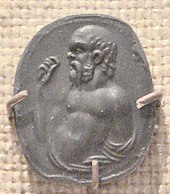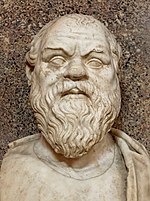Life
Details about Socrates can be derived from three contemporary sources: the dialogues of Plato and Xenophon (both devotees of Socrates), and the plays of Aristophanes. He has been depicted by some scholars, including Eric Havelock and Walter Ong, as a champion of oral modes of communication, standing up at the dawn of writing against its haphazard diffusion.[8]
Aristophanes' play The Clouds portrays Socrates as a clown who teaches his students how to bamboozle their way out of debt. Most of Aristophanes' works, however, function as parodies. Thus, it is presumed this characterization was also not literal.
Socrates' father was Sophroniscus,[9] a sculptor,[10] and his mother Phaenarete,[11] a midwife. Socrates married Xanthippe,[12] who was much younger than he and was characterized as undesirable in temperament. She bore for him three sons,[13] Lamprocles, Sophroniscus and Menexenus. His friend Crito of Alopece criticized him for abandoning his sons when he refused to try to escape before his execution.[14]
Socrates initially earned his living as a master stonecutter. According to Timon of Phlius and later sources, Socrates took over the profession of stonemasonry from his father who cut stone for the Parthenon. There was a tradition in antiquity, not credited by modern scholarship, that Socrates crafted the statues of the Three Graces, which stood near the Acropolis until the 2nd century AD.[15] Ancient texts seem to indicate that Socrates did not work at stonecutting after retiring. In Xenophon's Symposium, Socrates is reported as saying he devotes himself only to what he regards as the most important art or occupation: discussing philosophy. In The Clouds Aristophanes portrays Socrates as accepting payment for teaching and running a sophist school with Chaerephon, while in Plato's Apology and Symposium and in Xenophon's accounts, Socrates explicitly denies accepting payment for teaching. More specifically, in theApology Socrates cites his poverty as proof he is not a teacher.
Several of Plato's dialogues refer to Socrates' military service. Socrates says he served in the Athenian army during three campaigns: at Potidaea, Amphipolis, andDelium. In the Symposium Alcibiades describes Socrates' valour in the battles of Potidaea and Delium, recounting how Socrates saved his life in the former battle (219e-221b). Socrates' exceptional service at Delium is also mentioned in the Laches by the General after whom the dialogue is named (181b). In the Apology,Socrates compares his military service to his courtroom troubles, and says anyone on the jury who thinks he ought to retreat from philosophy must also think soldiers should retreat when it seems likely that they will be killed in battle.[16]
In 406, he was a member of the Boule, and his tribe the Antiochis held the Prytany on the day the Generals of the Battle of Arginusae, who abandoned the slain and the survivors of foundered ships to pursue the defeated Spartan navy, were discussed. Socrates was the Epistates and resisted the unconstitutional demand for a collective trial to establish the guilt of all eight Generals, proposed by Callixeinus. Eventually, Socrates refused to be cowed by threats of impeachment and imprisonment and blocked the vote until his Prytany ended the next day, whereupon the six Generals who had returned to Athens were condemned to death.
In 404, the Thirty Tyrants sought to ensure the loyalty of those opposed to them by making them complicit in their activities. Socrates and four others were ordered to bring a certain Leon of Salamis from his home for unjust execution. Socrates quietly refused, his death averted only by the overthrow of the Tyrants soon afterwards.[17]
Trial and death
Main article: Trial of Socrates
Socrates lived during the time of the transition from the height of the Athenian hegemony to its decline with the defeat by Sparta and its allies in the Peloponnesian War. At a time when Athens sought to stabilize and recover from its humiliating defeat, the Athenian public may have been entertaining doubts about democracy as an efficient form of government. Socrates appears to have been a critic of democracy,[18] and some scholars interpret his trial as an expression of political infighting.[19] Claiming loyalty to his city, Socrates clashed with the current course of Athenian politics and society.[20] He praises Sparta, archrival to Athens, directly and indirectly in various dialogues. One of Socrates' purported offenses to the city was his position as a social and moral critic. Rather than upholding a status quo and accepting the development of what he perceived as immorality within his region, Socrates questioned the collective notion of "might makes right" that he felt was common in Greece during this period. Plato refers to Socrates as the "gadfly" of the state (as the gadfly stings the horse into action, so Socrates stung various Athenians), insofar as he irritated some people with considerations of justice and the pursuit of goodness.[21] His attempts to improve the Athenians' sense of justice may have been the cause of his execution.
According to Plato's Apology, Socrates' life as the "gadfly" of Athens began when his friend Chaerephon asked the oracle at Delphi if anyone were wiser than Socrates; the Oracle responded that no-one was wiser. Socrates believed the Oracle's response was a paradox, because he believed he possessed no wisdom whatsoever. He proceeded to test the riddle by approaching men considered wise by the people of Athens—statesmen, poets, and artisans—in order to refute the Oracle's pronouncement. Questioning them, however, Socrates concluded: while each man thought he knew a great deal and was wise, in fact they knew very little and were not wise at all. Socrates realized the Oracle was correct; while so-called wise men thought themselves wise and yet were not, he himself knew he was not wise at all, which, paradoxically, made him the wiser one since he was the only person aware of his own ignorance. Socrates' paradoxical wisdom made the prominent Athenians he publicly questioned look foolish, turning them against him and leading to accusations of wrongdoing. Socrates defended his role as a gadfly until the end: at his trial, when Socrates was asked to propose his own punishment, he suggested a wage paid by the government and free dinners for the rest of his life instead, to finance the time he spent as Athens' benefactor.[22] He was, nevertheless, found guilty of both corrupting the minds of the youth of Athens and of impiety ("not believing in the gods of the state"),[23] and subsequently sentenced to death by drinking a mixture containing poison hemlock.[24][25][26][27]
According to Xenophon's story, Socrates purposefully gave a defiant defense to the jury because "he believed he would be better off dead". Xenophon goes on to describe a defense by Socrates that explains the rigors of old age, and how Socrates would be glad to circumvent them by being sentenced to death. It is also understood that Socrates also wished to die because he "actually believed the right time had come for him to die."
Xenophon and Plato agree that Socrates had an opportunity to escape, as his followers were able to bribe the prison guards. There have been several suggestions offered as reasons why he chose to stay:
- He believed such a flight would indicate a fear of death, which he believed no true philosopher has.
- If he fled Athens his teaching would fare no better in another country, as he would continue questioning all he met and undoubtedly incur their displeasure.
- Having knowingly agreed to live under the city's laws, he implicitly subjected himself to the possibility of being accused of crimes by its citizens and judged guilty by its jury. To do otherwise would have caused him to break his "social contract" with the state, and so harm the state, an unprincipled act.
- If he escaped at the instigation of his friends, then his friends would become liable in law.[28]
Socrates' death is described at the end of Plato's Phaedo. Socrates turned down Crito's pleas to attempt an escape from prison. After drinking the poison, he was instructed to walk around until his legs felt numb. After he lay down, the man who administered the poison pinched his foot; Socrates could no longer feel his legs. The numbness slowly crept up his body until it reached his heart. Shortly before his death, Socrates speaks his last words to Crito: "Crito, we owe a rooster to Asclepius. Please, don't forget to pay the debt."
Asclepius was the Greek god for curing illness, and it is likely Socrates' last words meant that death is the cure—and freedom, of the soul from the body. Additionally, in Why Socrates Died: Dispelling the Myths, Robin Waterfield adds another interpretation of Socrates' last words. He suggests that Socrates was a voluntary scapegoat; his death was the purifying remedy for Athens' misfortunes. In this view, the token of appreciation for Asclepius would represent a cure for Athens' ailments.[21]




No comments:
Post a Comment